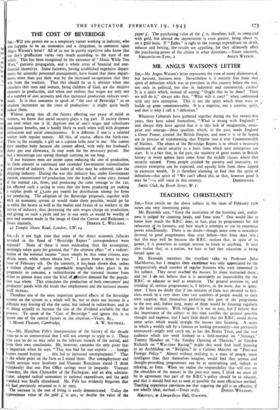THE COST OF BEVERIDGE
Spy—Will you permit me as a temporary turner working in industry, who also happens to be an economist and a clergyman, to comment upon Angus Watson's letter? All of us not in purely repetitive jobs know that our day's protfuction varies very much according to the state of our minds. This has been recognised by the existence of " Music While You Work," patriotic propaganda, and a whole array of financial and non- financial incentives. Some factories, having established expensive depart- ments for scientific personnel management, have found that these depart- ments more than pay their way by the increased co-operation that they win from the workers. That this should be so is obvious when one considers that men and women, being children of God, are the decisive elements in production, and when one realises that wages are only one of a number of cost accounts and that increased production reduces over- he heads. It is thus nonsense to speak of " the cost of Beveridge" as an in absolute increment on the costs of production: it might quite 'easily st reduce them.
ig Without going into all the factors affecting our peace of mind as to workers, we know that social security plays a big part. If society throws es one over when one is ill, deprives one of one's wages and substitutes Os inadequate benefits, one is hardly likely to work when well with desperate ur enthusiasm and social consciousness. It is different if one is a salaried worker with regular money. All this, of course, affects the birth-rate. al There is, for example, a girl on a capstan lathe near to me. She cannot have another baby because she cannot afford, with only her husband's rn Army pay and allowance, tb stop work for the necessary period. She had a miscarriage last spring through carrying on too long.
If our business men are intent upon. reducing the cost of production, let them consent to continued and extended Government rationalisation and control of industry. As an index of what may be achieved, take the dripping industry. During the war this industry has, under Government control, concentrated iteproduction into the hands of some sixty, instead of the normal 120, firms, and producing the same tonnage as the 120, has effected such a saving in costs that the -firms producing are making a surplus profit of £5,000 per month for distribution among the firms not producing. The adoption of the Beveridge proposals, together with such an economic system as would make them possible, would go far to enlist the hearts as well as the bodies and brains of us workers in the service of industry, thus decreasing the unit wages charge on production, and giving us such a pride and joy in our work as would be worthy of men and women made in the image of God the Creator and Redeemer.— Yours sincerely, DERRICK L. WILLIAMS. 43 Temple Sheen Road, London, S.W. 14-


























 Previous page
Previous page